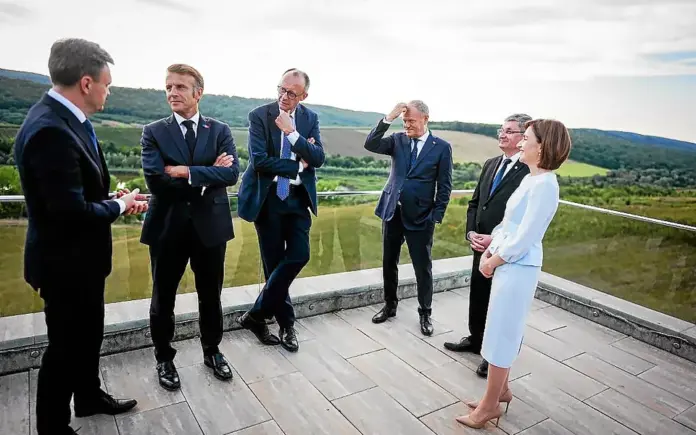A Pressured Republic Between European Aspirations and Russian Shadows
In Chisinau, on August 27, the spotlight was not truly on Emmanuel Macron or his Western counterparts, but squarely on Moldova itself—a modest republic caught between war-torn Ukraine and EU-member Romania. It is Moldova, often ignored, that now embodies the fault lines of modern Europe. It is Moldova, this fragile and exposed state, that has become the battleground of a hybrid war fought with cash, algorithms, and ceremony. The choreographed visit of French, German, and Polish leaders merely confirmed one thing: the future of Moldova no longer belongs solely to Moldovans.
A Visit with Strategic Weight
Marking the 34th anniversary of its independence, Moldova hosted three key representatives of the so-called Weimar Triangle. While official narratives emphasized European solidarity, the deeper agenda was obvious. This former Soviet republic—an EU candidate since 2024—is now viewed by Western strategists as a pawn too important to lose in the post-Ukraine chess game. Supporting pro-EU President Maia Sandu is, above all, a message to Moscow: the lines are shifting, and the West is moving in, cautiously yet decisively.
Interference, Separatism, and Controlled Alarmism
The talking points are familiar: Russian interference, separatist exploitation, digital manipulation… The Élysée endlessly recycles this narrative, spotlighting threats from Moscow—especially concerning the long-standing issue of Transnistria. This Russian-speaking breakaway region, with its contingent of Russian troops, has become a convenient symbol for maintaining a climate of managed tension. Western discourse on Moldova’s sovereignty is curiously always framed through the lens of Russian threat, rarely through that of internal resilience or economic renewal.
Cryptocurrency and Hybrid War
Moldova’s government accuses Moscow of channeling large sums—reportedly over €100 million—through cryptocurrency networks and encrypted messaging apps like Telegram to destabilize the upcoming elections. Grand claims, little evidence. Yet beyond the headlines, Moldova is becoming a testing ground for the next generation of economic and digital warfare. An open arena where the EU still struggles to impose its rules, despite its expanding footprint.
Between Social Fatigue and Empty Promises
Despite the pro-European activism of its leadership, ordinary Moldovans remain skeptical. Soaring inflation, systemic corruption, and a mass exodus of the young and educated cast doubt on the promise of EU salvation. Meanwhile, Moscow continues to hold sway over certain social segments, capitalizing on its messaging of sovereignty, tradition, and distrust of Western elites. The future of Moldova may depend less on declarations from Brussels and more on the Moldovan state’s ability to rebuild internal legitimacy.
Europe Still Searching for Leverage
For Brussels, Moldova represents a rare opportunity to prove it can stabilize its eastern neighborhood. Yet that ambition runs into a host of problems: the absence of long-term strategy, fragmented interests within the bloc, and a heavy dependence on U.S. security guarantees. Macron seeks a diplomatic comeback amid domestic unrest; Germany treads carefully after its energy missteps; Poland pursues its own regional ambitions. What Moldova receives is not unity, but a spectrum of overlapping, and often competing, Western interests.
Moldova as a Barometer for Europe’s Future
Once a peripheral republic, Moldova is now a geopolitical magnifying glass. It reveals the shortcomings of Western strategy, the persistence of Russian power, and the fragility of European unity. Beneath the official statements of “support,” subtle signals abound: shifting borders, digital threats, shadow diplomacy. The future of Moldova might become one of the defining tests of whether Europe can assert itself politically—or if it remains, as ever, reactive and fragmented.



